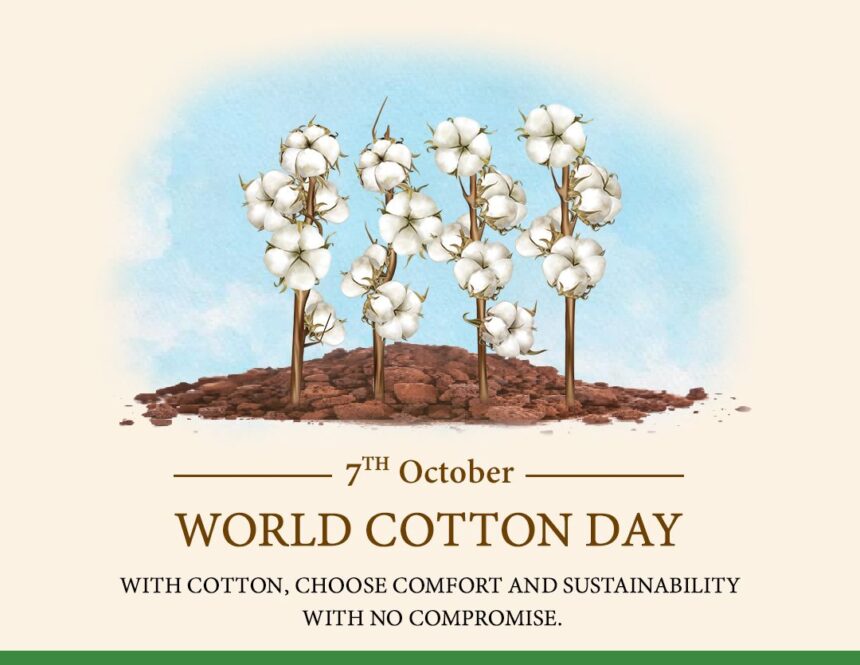🧵 Introduction: Cotton – The Fabric of Our Lives
From the clothes we wear to the sheets we sleep in, cotton silently supports our daily existence. It is more than a textile—it is a livelihood, a symbol of sustainability, and a vital economic resource. Celebrated every year on October 7, World Cotton Day sheds light on this often-underestimated crop and its impact across industries, societies, and households.
- 🧵 Introduction: Cotton – The Fabric of Our Lives
- 🗓️ Timeline of World Cotton Day
- 🧶 History of World Cotton Day
- 🌟 5 Powerful Truths That Make World Cotton Day Special
- 1. 👩🌾 Cotton Empowers Over 100 Million Families
- 2. 🌱 It’s a Natural, Renewable, and Biodegradable Fiber
- 3. 🧺 It Is Present in Every Home
- 4. 🤝 Cotton Demands Global Fairness
- 5. 🌍 It Aligns with the UN Sustainable Development Goals
- 📌 Key Facts About Cotton and World Cotton Day
- ❓ FAQs – World Cotton Day
- 🎉 How is World Cotton Day Celebrated?
- 🌸 Heartfelt World Cotton Day Wishes
- 🧠 Why Cotton is Important in Daily Life
- 🎯 Observance and Key Messages
- 🌾 Importance in Society
- 🧵 Life Impact & Personal Connection
- 🏁 Conclusion: A Call to Consciousness
Cotton has not only clothed civilizations for millennia but continues to uplift millions of farmers and workers, particularly in developing countries. So let’s unfold the story, the strength, and the social impact of this soft yet strong natural fiber.
🗓️ Timeline of World Cotton Day
| Year | Milestone |
|---|---|
| 2003 | Cotton-4 countries (Benin, Burkina Faso, Chad, Mali) propose cotton trade reforms |
| 2019 | First World Cotton Day celebrated in Geneva on October 7 |
| 2021 | FAO recognizes October 7 officially as World Cotton Day |
| 2022 | Global initiatives launched for cotton farmers’ welfare and fair trade |
| 2024 | Theme: “Making Cotton Fair and Sustainable for All” |
🧶 History of World Cotton Day
World Cotton Day was first organized by the World Trade Organization (WTO) on October 7, 2019, in Geneva, Switzerland. It was launched in response to a proposal by the Cotton-4 nations—Benin, Burkina Faso, Chad, and Mali—calling for fairer trade practices in the global cotton industry.
The goal? To raise awareness about:
The importance of cotton for livelihoods
The need for equitable market access for cotton-producing countries
The role cotton plays in sustainable development
In 2021, the Food and Agriculture Organization (FAO) officially recognized October 7 as World Cotton Day—solidifying it as a platform for cotton-producing nations to advocate for visibility, support, and fair pricing.
🌟 5 Powerful Truths That Make World Cotton Day Special
1. 👩🌾 Cotton Empowers Over 100 Million Families
Cotton provides livelihoods to 100 million households globally, including 7.5 million farmers in India alone. It’s not just a crop—it’s an ecosystem of life, feeding families, creating jobs, and enabling education.
2. 🌱 It’s a Natural, Renewable, and Biodegradable Fiber
Unlike synthetic fabrics, cotton is biodegradable, eco-friendly, and 100% natural. It breaks down without polluting oceans or harming soil—making it a sustainable fabric of choice.
3. 🧺 It Is Present in Every Home
Cotton is in:
Your bedsheets and towels
T-shirts, jeans, and baby clothes
Medical gauze, bandages, and swabs
Even coffee filters and currency notes
You wear it, sleep on it, and rely on it—even without noticing.
4. 🤝 Cotton Demands Global Fairness
The Cotton-4 countries export raw cotton but earn far less than rich nations that process and sell it as expensive textiles. World Cotton Day pushes for fair trade, equitable subsidies, and global respect for cotton growers.
5. 🌍 It Aligns with the UN Sustainable Development Goals
Cotton supports:
No Poverty (SDG 1)
Decent Work & Economic Growth (SDG 8)
Responsible Consumption (SDG 12)
Climate Action (SDG 13)
📌 Key Facts About Cotton and World Cotton Day
Date Observed: October 7 annually
Initiated by: WTO (2019)
Officially recognized by: FAO (2021)
Top producers: India, China, U.S., Brazil, Pakistan
World’s largest exporter: United States
Fastest-growing sector: Organic cotton and eco-conscious clothing
❓ FAQs – World Cotton Day
Q1: Why was World Cotton Day established?
To highlight cotton’s importance and advocate for fair trade policies that benefit developing nations.
Q2: Who observes World Cotton Day?
It’s observed by governments, textile industries, farmers, fashion brands, NGOs, and sustainability advocates.
Q3: Is cotton environmentally safe?
Yes, cotton is biodegradable, recyclable, and requires less energy than synthetic materials to produce. However, water management is crucial.
Q4: How can people participate in World Cotton Day?
Host awareness campaigns
Wear or buy locally made cotton
Support organic cotton farmers
Post on social media using #WorldCottonDay
Q5: What is organic cotton?
Cotton grown without synthetic fertilizers, pesticides, or genetically modified seeds—safer for the planet and people.
🎉 How is World Cotton Day Celebrated?
🏢 Government & Industry Level:
Panels and seminars on trade reforms, water conservation, and sustainability
Launch of new eco-labels and cotton-based startups
Policy discussions with WTO, FAO, and Cotton-4 leaders
🌱 Farmer & NGO Level:
Workshops on organic practices
Health camps for cotton workers
Training for women entrepreneurs in textile production
🌐 Social & Digital Media:
#WorldCottonDay trending on Twitter, Instagram
Eco-brands launch limited-edition cotton wear
Webinars and reels sharing farmer stories
🌸 Heartfelt World Cotton Day Wishes
“Wishing a Happy World Cotton Day to all the hands that bring us softness and strength—one thread at a time!”
“Here’s to the farmers, workers, and weavers—thank you for wrapping the world in comfort.”
“On this World Cotton Day, let’s commit to fair trade, sustainable choices, and global equity.”
“Celebrate cotton—the fabric that binds us all together.”
🧠 Why Cotton is Important in Daily Life
Breathable clothes in summer
Gentle on skin (especially for babies and elderly)
Hygiene essentials like cotton pads, wipes, masks
Supports small artisans and handmade industries
Cotton is often a first source of income for women in rural India, Africa, and Southeast Asia
🎯 Observance and Key Messages
Date: October 7
Recognize cotton as both economic and cultural backbone
Demand better pricing and policies for small-scale farmers
Embrace eco-conscious cotton use in daily life
Encourage young entrepreneurs in cotton-based startups
🌾 Importance in Society
🌍 Economically:
Cotton drives $50+ billion in global trade
Supports rural economies across Asia and Africa
Grows fashion, healthcare, home decor and agriculture simultaneously
🧑🤝🧑 Socially:
Empowers women in textile co-operatives
Preserves cultural identities like Khadi and handloom
Enhances livelihood resilience in vulnerable areas
🌳 Environmentally:
Organic cotton farming uses fewer chemicals
Reduces microplastic pollution compared to polyester
Can be grown in dryland areas with improved techniques
🧵 Life Impact & Personal Connection
Have you ever felt the warmth of a cotton shawl, the crispness of a cotton kurta, or the softness of a baby’s blanket? These daily moments of comfort owe their magic to cotton.
By supporting cotton industries consciously, you help:
A mother feed her family
A craftsman keep his loom running
A child wear breathable school uniforms
🏁 Conclusion: A Call to Consciousness
World Cotton Day is not just a celebration—it’s a call to rethink how we value what we wear. It reminds us to shift from fast fashion to fair fashion, and to recognize the millions of hands behind every cotton product.
Let this day be a tribute to the soil, the seed, and the soul of cotton—and the silent revolution it weaves across our world.









Wow! This can be one particular of the most beneficial blogs We have ever arrive across on this subject. Actually Great. I’m also a specialist in this topic so I can understand your hard work.